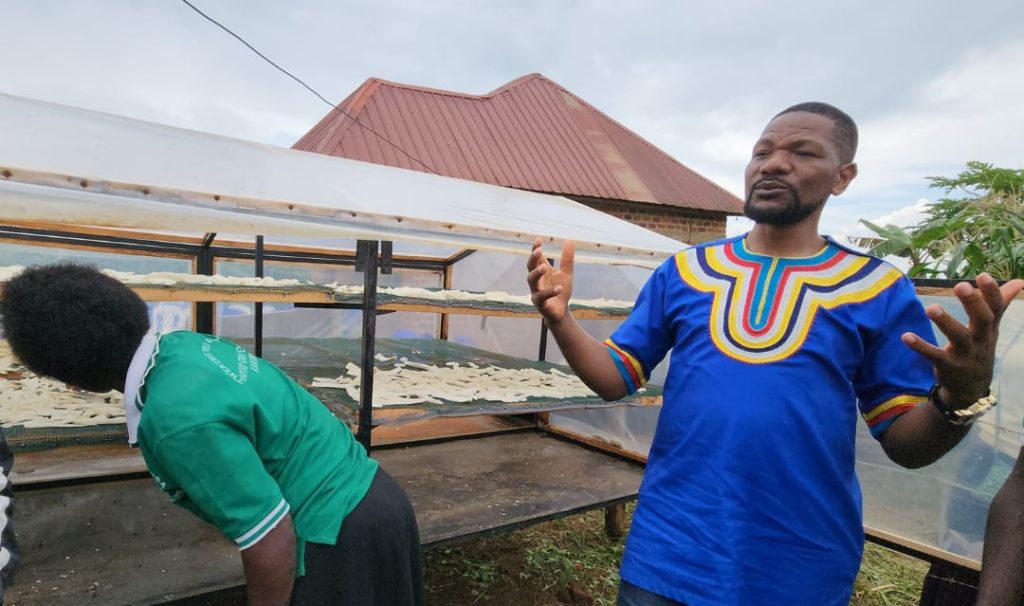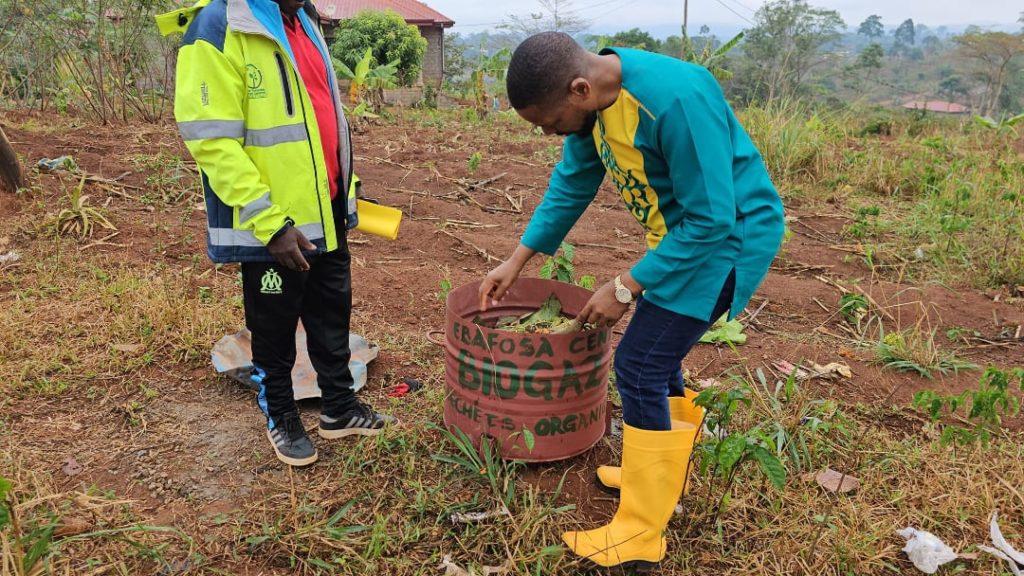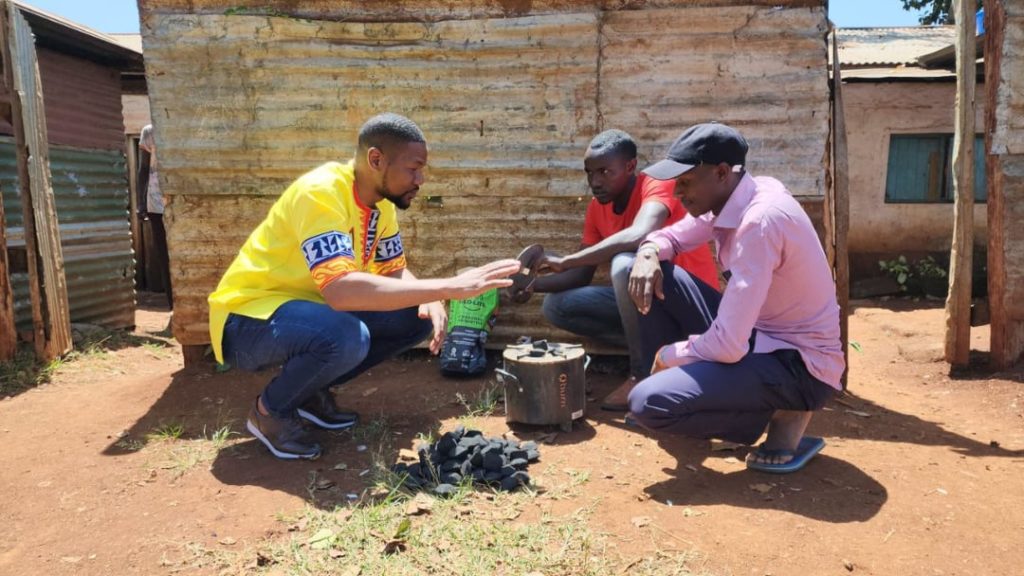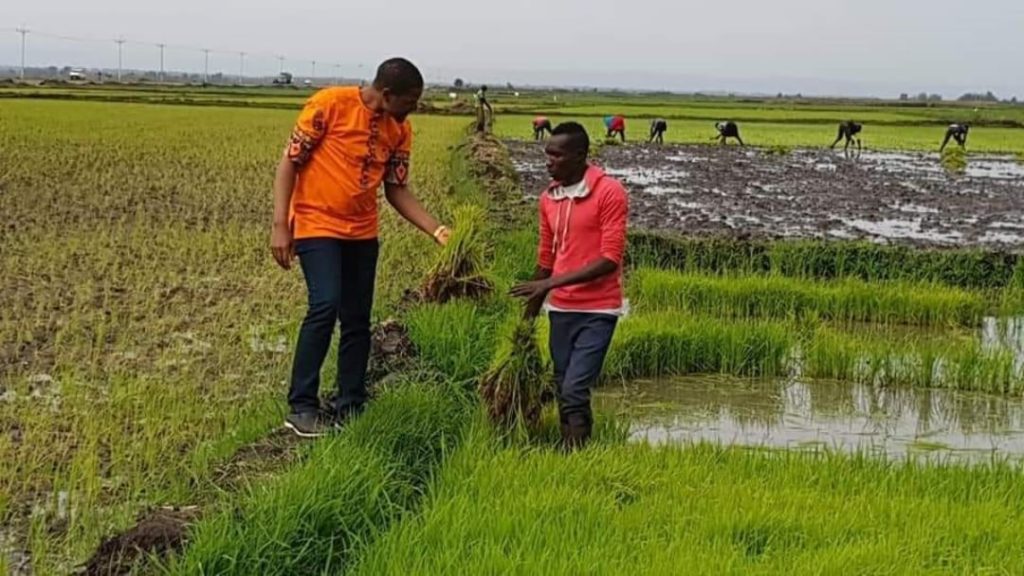Interview with Dr. Richard Munang, Deputy Regional Director of the UNEP Africa Office
- Team
- Apr, 11, 2023
- Interviews
- No Comments

In this interview, we are pleased to present Dr. Richard Munang, Deputy Regional Director of the United Nations Environment Programme (UNEP) Africa Office. With a strong background in climate change policy and resilience, Dr. Munang has made significant contributions to Africa’s climate policy landscape, including the establishment of the Ecosystem-Based Adaptation for Food Security Assembly (EBAFOSA). We will delve into his experiences, insights, and recommendations for tackling climate change in Africa and beyond. Join us as we learn from a respected leader in the field of sustainability.
Things we wanted to talk about with Dr.Munang:
- Role of sustainable tourism in Africa’s climate change strategies
- Sustainable tourism’s contribution to economic growth and job opportunities
- Sustainable tourism’s support for food security and EBAFOSA synergies
- Applying innovative volunteerism to sustainable tourism for local community involvement
- Challenges and solutions for sustainable tourism in Africa
- Examples of successful sustainable tourism initiatives in Africa
- Leveraging innovative volunteerism for sustainable development in sustainable tourism
- Role of international cooperation in promoting sustainable tourism in Africa
- Building capacity and empowering youth through sustainable tourism
- Key steps for African countries to fully embrace sustainable tourism’s potential
Dr. Munang, as the Deputy Regional Director of the UNEP Africa Office and a leader in climate-resilient development, what role do you think sustainable tourism plays in Africa’s climate change adaptation and mitigation strategies?
An insightful African proverb gives us a very good place to start, stating that “milk and honey have different colors, but they share the same house peacefully.” In context, this is a reminder of the symbiosis that exists between sustainable tourism or ecotourism and climate mitigation & adaptation. Ecotourism and climate action are self-reinforcing. Across Africa, tourism is a significant contributor to socio-economic transformation and has been so for the past two decades. In 2019, a peak year before the COVID-19 emergency, the industry accounted for about 7% of Africa’s GDP. It contributed up to $169 billion to its economy—about the size of Côte d’Ivoire’s and Kenya’s combined GDP, and employed up to 24 million people. The sector is also considered a high-growth sector – and is ranked the second fastest-growing in the world with a 171% growth in 2022 compared to 2020 and 2021 at the height of COVID-19, and revenues are projected to hit $261 billion by 2030. However, even with this growth and socio-economic benefits, the contribution of conventional tourism to climate change is clear. For every $1 generated, emissions of up to 1.45 kg have been reported. It is further recorded that a 1% increase in tourism activities worsens Africa’s environment quality by 1.09%.
But as the region increasingly adopts sustainable approaches in tourism, emissions have continued to drop by up to 11%. In addition, nature tourism is reported to generate higher income than general tourism.
„Nature-based tourism generates 40% more full-time employment than agriculture and provides greater opportunities for women than other sectors.“
This reality leads us to two key deductions. First, nature or ecotourism lowers the sector’s carbon footprint to contribute to reducing emissions and hence climate change risk over the long term. Second, and most importantly, for Africa, which is a negligible emitter, but which also stands out as disproportionately vulnerable because of a low socio-economic base, ecotourism generates more inclusive revenues to empower communities socioeconomically, enhance their socio-economic resilience by better placing them to afford alternatives that they need to buffer against the worst of the changing climate. For example, nature-based tourism generates 40% more full-time employment than agriculture and provides greater opportunities for women than other sectors.
So, there is a clear symbiosis between ecotourism and Africa’s fight against climate change.
Given your extensive experience in implementing climate-resilient strategies at both national and regional levels, how can sustainable tourism contribute to economic growth and employment opportunities, particularly for the youth and women in Africa?
Ecotourism generates more inclusive incomes than conventional tourism, enhancing socio-economic resilience while reducing the carbon footprint of the sector. The key here is tapping these opportunities inclusively for women and youth. I think three aspects are noteworthy.
First is tapping into sustainable food supply chains. Over 60% of Africa’s population is engaged in the agricultural sector, with most of the food – up to 80% – grown by women. Tourists stimulate demand for agriculture, fisheries, food processing, etc., with expenditures in Africa that can be as high as two times the expenditures on accommodation. If tourism players prioritise sourcing from producers using nature-based approaches and clean energy-processed agro-products, this will significantly integrate sustainability into food systems through the tourism lens. Considering the high participation of women in the food value chain in Africa, these revenues will similarly accrue to women. Regarding youth, while they may not participate at the farm level, they can intervene along the supply chain. For example, young people engaged in value-added actions along this supply chain, like decentralising simple, clean energy solutions such as solar dryers, can enable agri-producers using nature solutions to preserve and increase the shelf life of their perishables as they supply touristic centers. This will contribute to enhancing sustainability in the tourism sector supply chain.
Second is partnerships for conservation with indigenous communities, including women and youth, living in tourism attraction areas. An example from Rwanda best illustrates this. The country worked to rehabilitate and conserve the Volcanoes National Park, best known for mountain gorillas. They collaborated with the community to preserve the park and share revenue from touristic activities around the park. To this end, the community has earned up to $3 million. These partnerships provide a timely incentive for enhanced conservation efforts and should be a strategy for improving ecotourism efforts.
Third is skills retooling for the above. Engagement in tapping sustainable food value chains and indigenous communities engaged in conservation efforts jointly with government calls for retooled skills. Working with inclusive academic institutions, such as polytechnics, to train young people to engage in these actions and train the community in conservation will ensure ready manpower to tap into ecotourism efforts.
Fourth is policy incentives. Success in the above actions needs to inform more targeted policy incentives that will enable further expansion.
You have been a pioneer in developing the Ecosystem-Based Adaptation for Food Security Assembly (EBAFOSA) policy framework. How can sustainable tourism practices support food security in Africa, and are there any synergies between the two?
One word crystallises synergies between these two – and that is markets. Sustainable tourism is a source of demand markets for food systems. As I shared earlier, tourist expenditures on food can usually be as high as two times what is spent on accommodation. If the entire tourism sector can source from sustainable food chains, that will significantly boost both sustainability and food systems. For example, food grown using nature-based solutions can fetch up to 3 times more than conventional foods, boosting tourist industry players and food system players.
But the question is, how can this dimension be incentivised? The answer is in national standards. There is a need for national standards bodies across Africa to provide certification for foods that are produced and value-added using nature-based, clean-powered solutions, and in so doing, tap into clients that are healthy and environmentally conscious. In this way, both the tourism and food systems industries get to enhance their earnings. We get the tourism sectors directly contributing to investing in food systems, specifically nature-based food systems that are climate-resilient and shown to increase food yields by up to 128%. They also contribute to creating demand for investment in clean energy solutions, including simple solutions like solar dryers that have been shown to reduce post-harvest losses, increase earnings by up to 30 times, and increase food security.
„If the entire tourism sector can source from sustainable food chains, that will significantly boost both sustainability and food systems.“

As a strong advocate for innovative Volunteerism, how can this approach be applied to sustainable tourism in Africa to promote local community involvement and ownership?
Innovative Volunteerism is about engaging most of the continent’s population to tap the most critical form of capital to drive environmental action – and that is human capital. It is about tapping different actors’ skills, talents, creativity, knowledge, and ongoing work towards driving climate & environment action from an enterprising lens. Therefore, tapping into this human capital to drive sustainable tourism is the core of how Innovative Volunteerism can drive ecotourism. So how do we incentivise Innovative Volunteerism for sustainable tourism? I have already shared some key pointers as follows.
First is skills retooling. We need communities, young people, and other players in the tourism industry to be trained on how to leverage what they already do and adapt and refine it to tap into ecotourism. All learning institutions at all levels that train Africa’s population about the continent’s wildlife and touristic resources need to empower learners to prioritise touristic innovations and products that ensure environmental conservation and climate action are incentivised as a strategy for enhancing their business, not a footnote or token for conservation efforts alone.
Second, ecotourism’s narrative needs to focus more on its superior socio-economic benefits and not be confined to environmental conservation alone. Most people act when they see a socio-economic benefit, and ecotourism in Africa can be popularised when it is premised on creating more lucrative income opportunities when compared to conventional tourism.
„Ecotourism in Africa can be popularised when it is premised on creating more lucrative income opportunities when compared to conventional tourism.“
Third is partnerships with indigenous communities. Across Africa’s tourism, wildlife stands out as the largest earner. Up to 80% of tours are for wildlife watching. Wildlife is what tourists want to see when they visit the continent. But in most cases, while wildlife game parks are near human habitations, these communities who live near the wildlife habitats are not always engaged in conservation. They also do not see the economic value of such wildlife as the game parks because most of what is earned is taken up as government revenue. There is an urgent need to rope communities into conservation efforts, out of which they reap a share of the profits in the tourism sector. This then becomes an incentive for their active participation in conservation. This way, the wildlife and other touristic assets become a source of tangible socio-economic opportunities that the communities can tap.
Fourth is fiscal incentives for informal sector actors who engage in ecotourism. Innovative Volunteerism takes special prioritisation of informal sector actors, who constitute over 80% of Africa’s working population, to tap them as sources of investment in environmental matters. To this end, ecotourism also needs to prioritise such strategies. Consequently, informal sector actors who engage in eco-touristic activities need to be incentivised fiscally – e.g., tax breaks to lower operational costs and enhance their profitability. Another approach will be enhancing access to affordable capital for such actors through leveraging cash guarantees that the government can give to private sector financiers to finance eco-touristic enterprises at reasonable interest rates.
Fifth is data for policy. Data on empirical successes of the above actions must be leveraged to inform more targeted policy incentives that address specific gaps and opportunities needed to expand on such successes.

In your opinion, what are the most significant challenges facing sustainable tourism in Africa, and how can they be addressed through policy interventions and collaboration between stakeholders?
I think the most significant challenge relates to narrative and publicity. Africa is one of the most biodiversity-rich continents globally. It is the last place on Earth with a significant variety of large, land-based mammals. This comparative advantage needs to be fully tapped by ensuring the continent’s tourism narrative is primarily focused on ecotourism. In this way, the region can tap into this comparative advantage to become a source of distinction, offering a unique product in the global tourism market.
The other significant challenge relates to environmental degradation. Populations of African vertebrate species are estimated to have declined by 39% since 1970. Africa hosts 9 of the world’s 36 biodiversity hotspots, with rare species. For example, in Madagascar, 82% of its plants and 90% of its animals are rare and create irreplaceable ecosystems. These rare species give Africa an edge in ecotourism, and if they are lost, the region also loses its unique comparative advantage.
On how to address these challenges,
First, on policy – I think Africa is a leader in policy. The continent is a signatory to some of the most critical multilateral conventions that cut across biodiversity. Up to 50 African countries are signatories to the CITES convention that addresses the challenge of endangered species, which are usually a key touristic heritage. The continent shows a 92% confidence level in this Convention. Up to 46 countries – with an 85% confidence level – have ratified the Convention on Biological Diversity (CBD). All these are some of the most critical policy instruments to enhance the ecological foundation of ecotourism. But what is needed now are clear incentives to attract implementation capacity from a multiplicity of stakeholders – state/non-state – for the continent to continually protect the ecological base of ecotourism. For example, industry players increasingly being educated on the superior economic benefits of ecotourism will be a critical incentive to drive the market-driven popularisation of ecotourism.
„Mutual partnerships between governments as custodians of biodiversity and indigenous communities towards protecting eco-touristic sites can go a long way to creating socio-economic incentives for community-led conservation efforts that protect the ecological base of ecotourism.“
Second, on degradation, mutual partnerships between governments as custodians of biodiversity and indigenous communities towards protecting eco-touristic sites – like the example from Rwanda, can go a long way to creating socio-economic incentives for community-led conservation efforts that protect the ecological base of ecotourism.

Can you share any examples of successful sustainable tourism initiatives or projects that have had a positive impact on local communities and the environment in Africa?
The example from Rwanda involving the Volcanoes National Park demonstrates how communities can be encouraged to engage in ecotourism, which in turn allows them to earn up to $3 million that can be invested in various other aspects of their livelihoods.
There are several other ecotourism destinations in Africa. From conservation efforts to protect South Africa’s rhinos, Uganda’s chimpanzees, sea turtles in Seychelles, birdlife in Kenya, and more, many successful sustainable tourism initiatives in Africa are well documented online. What is more important is for countries across the continent to learn from each other and replicate these successes. Frameworks, such as the AfCFTA agreement, serve as an incentive to this end because the visa-free travel across the continent being promoted by this agreement will go a long way in consolidating the domestic tourism sector in Africa and thereby grow the benefits of ecotourism. It is worth noting that up to 55% of tourism revenues in Africa are from domestic tourists. With the easing of visa requirements, travel for more Africans will be facilitated, thereby unlocking a growing continental market that can be tapped to expand the region’s ecotourism through replicating successes.

What role can international cooperation and partnerships play in promoting sustainable tourism in Africa, and how can these collaborations enhance the continent’s capacity to address climate change?
I think Article 6 of the Paris Agreement provides a practical framework for international collaboration to promote ecotourism. An estimated 50% of all tourists who come to Africa are international. Through Article 6 provisions, African governments and travel agents can work with their counterparts in the tourists’ countries of origin to create attractive incentives for those who book locations specialising in ecotourism. For example, less stringent visa rules for ecotourists, price cuts in ecotourism packages, etc. The choices made at this level will then have a knock-on effect on climate change by providing additional incentives to protect biodiversity, contributing to addressing climate change.
For example, with over 90% of the country’s landmass covered in rainforests, Gabon is the lung of Africa and one of the world’s most important habitats in the face of climate change. These forests are also home to over 95,000 critically endangered forest elephants, making the country the last stronghold for the species’ survival. Preventing human-wildlife conflict is instrumental to preserving this biodiversity. The government has worked with international actors to develop a bespoke portable electric fence that matches the Gabon context and is thus up to 90% effective and highly replicable. In this way, international cooperation protects an eco-touristic site, which also contributes to sequestering global carbon.
„Gabon is the lung of Africa and one of the world’s most important habitats in the face of climate change.“

Lastly, looking forward, what do you believe are the key steps that African countries must take to fully embrace and capitalize on the potential of sustainable tourism as a tool for climate-resilient development and poverty alleviation?
By offering a market for the solutions devised by young people through Innovative Volunteerism. I did mention sustainable tourism players tapping into sustainable food systems supply chains as an example. This has the knock-on effect of supporting a chain of potential enterprises areas that young people can engage in – be it the development of sustainable inputs like bio-fertilisers and bio-pesticides that can fetch up to 500% in profitability or devising simple, clean energy value addition solutions like solar dryers that can increase earnings up to 30 times.
Sustainable tourism should increasingly grow from protecting touristic sites to tapping sustainable supply chains for hotels, e.g., sustainable food systems, clean energy / energy efficiency, water efficiency, waste recovery, etc. Making this an industry standard creates many sustainable income and job opportunities for young people.





